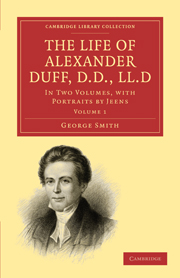Book contents
- Frontmatter
- Contents
- CHAPTER I THE BOY AND THE STUDENT
- CHAPTER II THE FIRST MISSIONARY OF THE CHURCH OF SCOTLAND
- CHAPTER III THE TWO SHIPWRECKS
- CHAPTER IV CALCUTTA AS IT WAS
- CHAPTER V THE MINE PREPARED
- CHAPTER VI THE FIRST EXPLOSION AND THE FOUR CONVERTS
- CHAPTER VII THE RENAISSANCE IN INDIA — THE ENGLISH LANGUAGE AND THE CHURCH
- CHAPTER VIII THE RENAISSANCE IN INDIA—SCIENCE AND LETTERS
- CHAPTER IX WORK FOR EUROPEANS, EURASIANS AND NATIVE CHRISTIANS
- CHAPTER X THE INVALID AND THE ORATOR
- CHAPTER XI DR. DUFF ORGANIZING
- CHAPTER XII FISHERS OF MEN
- CHAPTER XIII EGYPT—SINAI—BOMBAY—MADRAS
- CHAPTER XIV FIGHTING THE GOVERNOR-GENERAL
- CHAPTER XV THE COLLEGE AND ITS SPIRITUAL FRUIT
CHAPTER VII - THE RENAISSANCE IN INDIA — THE ENGLISH LANGUAGE AND THE CHURCH
Published online by Cambridge University Press: 05 July 2011
- Frontmatter
- Contents
- CHAPTER I THE BOY AND THE STUDENT
- CHAPTER II THE FIRST MISSIONARY OF THE CHURCH OF SCOTLAND
- CHAPTER III THE TWO SHIPWRECKS
- CHAPTER IV CALCUTTA AS IT WAS
- CHAPTER V THE MINE PREPARED
- CHAPTER VI THE FIRST EXPLOSION AND THE FOUR CONVERTS
- CHAPTER VII THE RENAISSANCE IN INDIA — THE ENGLISH LANGUAGE AND THE CHURCH
- CHAPTER VIII THE RENAISSANCE IN INDIA—SCIENCE AND LETTERS
- CHAPTER IX WORK FOR EUROPEANS, EURASIANS AND NATIVE CHRISTIANS
- CHAPTER X THE INVALID AND THE ORATOR
- CHAPTER XI DR. DUFF ORGANIZING
- CHAPTER XII FISHERS OF MEN
- CHAPTER XIII EGYPT—SINAI—BOMBAY—MADRAS
- CHAPTER XIV FIGHTING THE GOVERNOR-GENERAL
- CHAPTER XV THE COLLEGE AND ITS SPIRITUAL FRUIT
Summary
Lord William Bentinck was ready. He had enjoyed what some call the drawbacks, but all true men pronounce to be the real advantage, of being a younger son. The second son of the third Duke of Portland, Lord William Cavendish Bentinck was thrust out into positions where he developed for the good of humanity all those virtues and that ability which had made Hans. William, the founder of the house, second only to his friend William III. as a benefactor of Great Britain. Because, while still under thirty, he happened to be Governor of Madras when the family of Tippoo provoked the mutiny of Vellore, Lord William Bentinck was recalled by the Court of Directors for exacly the same avowed reason which caused their own extinction after the Mutiny of 1857. In the interval before his return to India as Governor-General the young administrator secured a constitution for Sicily, and, in 1814, he would have restored the old republic of Genoa but for Lord Castlereagh's stupidity. It was one of the many merits of George Canning that, during his too brief term as Prime Minister, he sent Lord William Bentinck to govern all India. Already, when Duff landed, had the new Governor-General spent two of the seven years which have marked the page of British India with triumphs hardly less brilliant than those of the Marquis Wellesley, and paralleled only by the later achievements of the Marquis of Dalhousie.
- Type
- Chapter
- Information
- The Life of Alexander Duff, D.D., LL.DIn Two Volumes, with Portraits by Jeens, pp. 178 - 205Publisher: Cambridge University PressPrint publication year: 2010First published in: 1879



